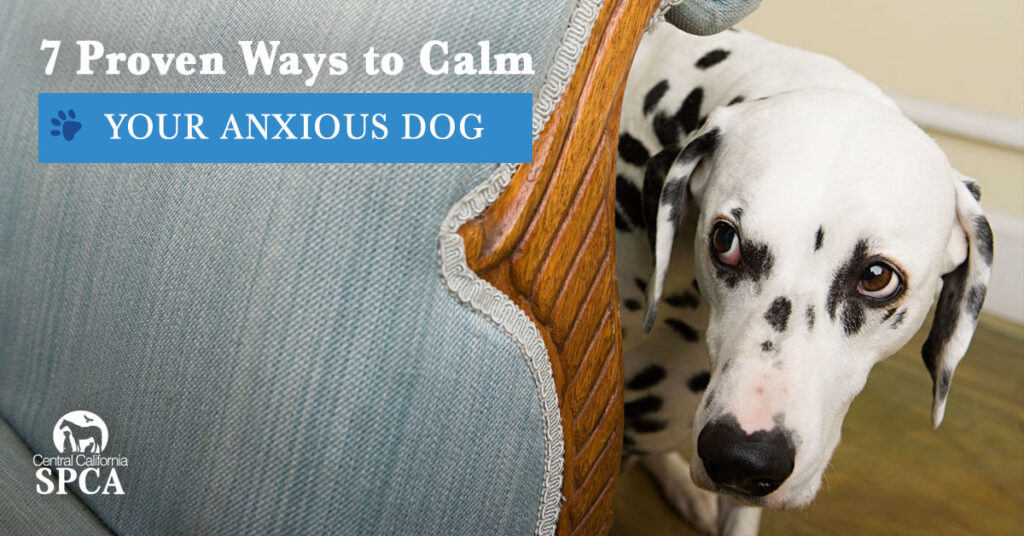
Anxiety is not only a common trait in humans, but animals can also suffer as well. Many of the dogs in our care have anxiety — which usually stems from being abandoned by their owners and the shelter environment in general.
Just like with other unhealthy behaviors — biting, barking, chewing on everything in sight — anxiety can be treated. Anxiety can be totally cured, but sometimes it can only be managed; noticeable under certain circumstances.
If you have a dog that suffers from anxiety, this post is a must-read. We’ll outline several proven methods for supporting your anxious dog and promoting a happy healthy life.
So let’s take a look at what can cause your dog’s anxiety and the most common proven ways to calm your anxious dog.
Anxiety in Dogs
Anxiety can manifest itself in multiple ways, from whining and barking to shivering and whimpering. You may also find that your dog becomes destructive or hostile when anxious. Over time, they may lose their appetite and become completely withdrawn if the anxiety is not addressed.
The most common reasons for anxiety in a dog is abandonment, fear of being home alone, loud noises, traveling, and/or being around strange people, children, or other pets. We’ve also seen the anxiety in dogs that have been abused or neglected.
The best way to treat your canine companion is to determine the cause. Anxiety is usually evident and easily identified. Once you pinpoint the reason, you can go about treatment management.
7 Proven Ways to Calm Your Anxious Dog
1. Exercise Your Dog
If your dog has separation anxiety, the obvious way to ease their mind is to never leave them alone. That is not a reality for most pet owners, so using exercise as both a bonding time and to tire out your pet is often an easy fix!
Because anxiety can cause an excess of energy, taking your dog out to play ball or on a long walk before you leave can be helpful. Providing plenty of physical contact and talking to them during this time is also beneficial.
2. Physical Contact
There is probably nothing more soothing to an anxious dog than its owner’s touch. Try to identify the signs of anxiety in your dog and nip them in the bud as early as possible by picking them up, cuddling on the couch, or giving them a good long petting session.
3. Massage
As you probably know, a massage will relax and calm even the most anxious human — did you know it also works wonders with dogs as well?! Anxiety often causes tensing of the muscles and massage therapy is one way to alleviate tension. Start at the neck and work downward with long strokes. Try to keep one hand on the dog, while the other works to massage. Over time you may even be able to identify where your dog holds its stress and just work on that one particular area.
4. Music Therapy
Music therapy has been proven to be beneficial for both humans, as well as our canine and feline friends. The power of music can be calming and relaxing while you’re home, in the car, or away from your pet. Music can also alleviate noise sensitivity by blocking the street or scary noises that bother some dogs and create anxiety.
Research has shown that many dogs prefer classical music. Harp music, often used in hospice situations, can be a natural sedative. You might try:
-
Through A Dog’s Ear by pianist Lisa Spector and psychoacoustics researcher Joshua Leeds
-
Noah’s Harp: Surrender by Susan Raimond
5. Time-Out
While anxiety isn’t a bad behavior per se, it can help to give your dog some time-out when they’re acting out. Isolating your pet in a safe and quiet space can help calm their frayed nerves. Maybe that space has some very quiet music playing, low lights, and/or some aromatherapy available (see below “Alternative Therapies”).
6. Alternative Therapies
While there is limited evidence that alternative products can be of benefit to dogs suffering from anxiety, the products listed below are non-invasive and will cause no harm. They are therapies that can be used alone or combined with those above to be more effective. Be sure to do proper research before implementing alternative therapies, and consult with your veterinarian, too.
Note: There are other homeopathic remedies that can be used on pets for specific issues, like constant barking, intolerance toward strangers, or loss of an owner. For a full list, check here.
Supplements
There are dog treats that contain helpful supplements proven to help anxiety. Typically they will contain melatonin, thiamin, chamomile, L-Theanine or L-tryptophan. Some also have a ginger element to help with sensitive stomachs. These are often recommended for general and travel anxiety. Find our favorite pet supplements here.
Diffusers & Pheromones
Did you know there are pet-friendly diffusers? Basically aromatherapy for pets! These use pheromones to help allay fears, much like a nursing mother gives off to her puppies. It is easy to use: just plug the diffuser into the room your dog spends the most time in. The Adaptil diffuser releases “dog-appeasing” pheromones, an odorless scent particular to dogs. (Humans, cats, and other pets will not smell anything.)

